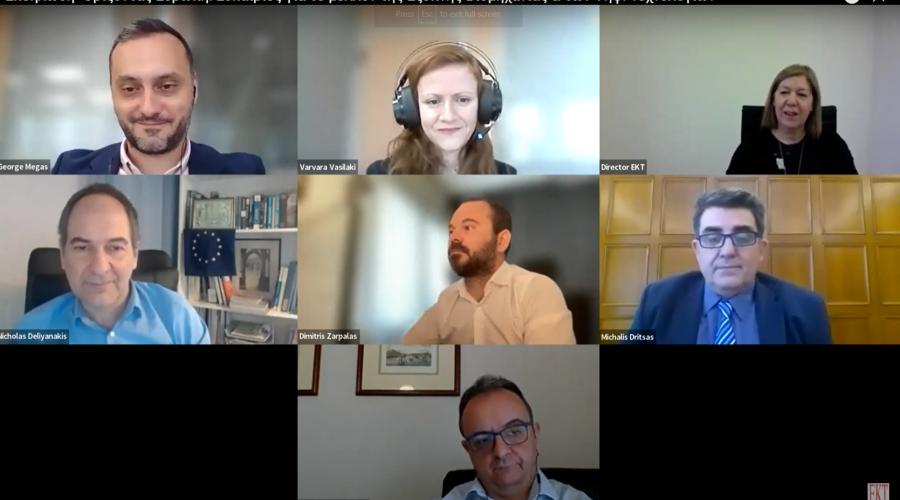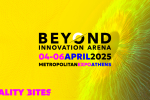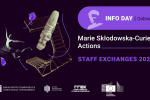
With 250 participants from the Greek research and innovation ecosystem of Digital Technologies and Industry, the online event ‘Horizon Europe: Opportunities for the Future of Smart Industry & Digital Technologies’, organised by the National Documentation Centre (EKT), National Contact Point for Horizon Europe and Coordinator of Enterprise Europe Network-Hellas, was held on Thursday 10 March 2022.
The event was organised in collaboration with the General Secretariat for Research and Innovation (GSRI) and the European Commission (Directorate-General for Content Communication Networks and Technologies - DG CNECT, and Directorate-General for Research and Innovation - DG RTD).
Representatives of the European Commission gave presentations on the topic of Digital Technologies and Industry (Cluster 4) in Horizon Europe and the new calls that are expected to open or have already opened. National Representatives of Cluster 4 talked about financial opportunities and Greek participation in Cluster projects, while the National Contact Points for Cluster 4 presented the ways that support the participation of the research and business community in Horizon Europe projects. In addition, there was a special group of presentations with Greek success stories in the field of Smart Industry and Artificial Intelligence.
In her greeting, the Director of EKT, Dr. Evi Sachini, referred to the strategic importance for Europe and Greece of the changes brought about by the developments in the cutting edge sector of digital technologies and smart industry. She stressed the need for industrial autonomy, the provision of smart and reusable raw materials and the production of integrated circuits, actions that the EU has emphasised through Cluster 4, as examples that will digitally and technologically strengthen Member States and their societies. Finally, she stressed the role of EKT as a National Contact Point in Horizon Europe for Cluster 4, highlighting the value of the country’s research and business community, which has all the guarantees for successful proposals this year.
Michalis Dritsas, Director of the Office of the Deputy Minister of Development & Investment, Dr. Christos Dimas, emphasised the role of EKT in the previous Horizon 2020 programming period in supporting organisations and companies in the respective calls, which brought funding to the country and contributed significantly to the transformation of the Greek ecosystem of innovation and entrepreneurship.
The presentations of the representatives of the European Commission followed. Dr. Nicholas Deliyanakis, Policy Officer of the Directorate-General for Industrial Transformation (DG RTD), presented the Industry cluster, explaining the vision when designing the cluster that was human-centered, focusing on society as a whole, the employee, the citizen, and respect for the planet. He then presented the Destinations of Cluster 4, with an emphasis on Destination 1 (green and digital transition) and Destination 2 (Sustainability) and the key strategic orientations, while emphasising the contribution of the Humanities to the projects of Cluster 4, with the aim of strengthening and improving research results for the benefit of society as a whole.
The current funding calls and the changes in relation to the previous programming period on the topic of Digital Technologies and Artificial Intelligence were analysed in turn by Dr. Evangelia Markidou, from the General Directorate of Communications Networks, Content & Technology (DG Connect. She also mentioned the expected results from the cluster projects, which should improve the quality of life of citizens, a fact that should be reflected in the proposals.
Dr. Mara Chachamidou, National Representative for Cluster 4 (Digital, Industry) from the General Secretariat for Research and Innovation, presented the country’s participation in Destinations 1 and 2 in the calls of Cluster 4 of Horizon Europe and its very good performance in its participation in the previous programming period (Horizon 2020).
The event continued with presentations of success stories from Greece in the field of Smart Industry and Artificial Intelligence.
Prof. Stergios Logothetidis, President of the Hellenic Association of Organic & Print Electronics of Greece, LTFN Nanotechnology Laboratory of the Aristotle University of Thessaloniki, referred to the new technology of inorganic semiconductors and nanotechnology that opened new avenues in applications, energy and automation. These technologies were developed with Horizon 2020 projects and exporting the technologies from the laboratory for the purpose of large-scale industrial production was a great challenge.
Professor George Arabatzis, Assistant Professor at the School of Production Engineering and Management of the Technical University of Crete, talked about three projects of his team that are underway and transforming the Industrial sector, such as LPG refining and water treatment and recycling for factories. The projects are implemented in collaboration with major partners, multinational companies and research organisations, while the results of the research are applied in pilots for large European industrial units. Finally, Prof. G. Arabatzis presented the technologies that facilitate digital transformation, while he gave tips for the successful outcome of a proposal for funding in Cluster 4 of Horizon Europe.
Dr. Dimitris Zarpalas, from the Optical Computing Laboratory, Institute of Information and Communication Technologies of CERTH, presented his own success story from the spinoff D-Cube, created by himself and his team, using research results from a Horizon 2020 project. D-Cube has won the BoostUp Award for the sustainable, resilient and anthropocentric solution it has created, while already providing factories in Europe with solutions and technologies.
The Cluster 4 National Contact Points for Horizon Europe were then presented by representatives of EKT.
Varvara Vasilaki, National Contact Point for Industry and Innovation Advisor, presented the integrated EKT services as a National Contact Point in Horizon Europe Cluster 4, which complements all of the organisation’s activities such as its co-ordinating role in Enterprise Europe Network Hellas and as a Greek hub of EIT Health, for the benefit of the research and business community of Greece. She referred to the ways in which EKT supports the research and business community in submitting proposals to Horizon Europe, and emphasised gender mainstreaming, in line with the eligibility criteria now set by the EU, not only in relation to the existence of a Gender Equality Plan (GEP), but also in the research work of the interested party as a whole.
Nikos Maniadakis, National Contact Point for Industry and Innovation Consultant, presented the ‘Knowledge and Partnership Bridges’ initiative implemented by EKT, its updated digital platform and its potential for use within Horizon Europe. The initiative, N. Maniadakis pointed out, makes use of the knowledge and know-how of Greeks operating abroad, and their connection with Greece and can now provide information on financial opportunities and specialised guidance. The new upgraded digital platform of the initiative is designed to provide its members with value-added services and can be a tool for activating stakeholders and enhancing the exploitation not only of Cluster 4, but also of Horizon Europe in general.
Marios Roidis, Innovation Advisor at EKT, presented the Enterprise Europe Network, one of the largest European business support networks. EKT is the co-ordinator of the Greek node of the European network, with responsibility for supporting innovative and extroverted Greek companies to gain access to new markets and financing. The services it offers include international business, technology and research collaborations, knowledge exchange and technology transfer, participation in business missions and brokerage events. In particular, M. Roidis stated that the Enterprise Europe Network helped 14,000 companies to sign business or research collaborations and 200,000 companies to take part in networking events in the decade 2008-2018.
Throughout the event, the audience were able to ask the speakers live questions which were answered at the end of the presentations. The event was co-ordinated by George Megas, main National Contact Point for Cluster 4 at EKT, and Varvara Vasilaki, National Contact Point for Industry at Cluster 4 at EKT.
All the event presentations are here, while you can watch the whole event here (video).
Watch the video of the event
Cluster 4 of Horizon Europe
Cluster 4 is one of the Pillar II programmes to address global challenges and industry competitiveness million. With a budget of about 15 billion, the primary vision behind the proposed investments is that of Europe shaping competitive and reliable technologies for a European industry that will lead the world in key areas, enhancing the environmental protection dimension in the production process, and consumption, with respect for the limits of our planet. The aim is to move towards a competitive, digital, low-carbon and circular industry that will ensure a sustainable supply of raw materials, develop advanced materials and provide the basis for progress and innovation in global challenges for society. The expected impact of this Cluster is included in the Horizon Europe strategic plan.
EKT as National Contact Point of Horizon Europe
EKT is a National Contact Point (NPC) for Horizon Europe, specifically the Marie Skłodowska-Curie Actions (MSCA) programme of Pillar 1 and the 'Health' and Digital Technologies, Industry and Space' sectors of Pillar 2. It supports organisations, companies, academics and research organisations: from identifying funding opportunities to drafting and submitting proposals, implementing projects and exploiting research results. In addition, it contributes to the recording and analysis of Greece’s participation in European research and innovation programmes. As a National Contact Point, it supports ongoing projects under Horizon 2020. EKT is a key member of the Horizon Europe’s network of Ideal-ist and Industry NCP4Industry.
EKT is the first Digital Innovation Hub (DIH) in Greece to be registered in the European Commission list. It actively participates in the DIH Expert Group of the European Commission. EKT is also the co-ordinator of the Greek EIT Health node in Greece.
With combined value-added services, EKT supports the Greek research and business community to excel and grow internationally. As co-ordinator of the Greek node of the Enterprise Europe Network, the largest business support network in the world, it provides services complementary to those of the National Contact Points, acting as a ‘one-stop-shop’ informing companies about European issues, finding business partnerships abroad, technology transfer and innovation services, mediation for international technological collaborations, access to European funding and finding partners to participate in research proposals.
















